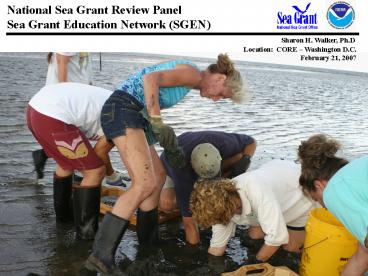National Sea Grant Review Panel
1 / 18
Title: National Sea Grant Review Panel
1
National Sea Grant Review Panel Sea Grant
Education Network (SGEN)
Sharon H. Walker, Ph.D.
Location CORE Washington D.C. February 21,
2007
2
1966 Legislative Mandates
Research
Communication
Communication
Administration
Adv. Service/ Outreach
Education
Communication
3
The National Sea Grant Strategic Plan states
- Educating the 21st Century workforce in
marine and aquatic sciences is integral to both
the educational and scientific missions. Sea
Grants multifaceted education efforts
contribute to improving marine and aquatic
literacy by facilitating the delivery of science
based information, programming, and resources
to formal and informal education communities.
4
A working definition
- Sea Grant education builds knowledge of
the marine and aquatic environment by developing
and enhancing multidisciplinary instruction and
learning among audiences ranging from children to
adults. Information is delivered using both
formal and informal methods and science-based
content. An exemplary and comprehensive Sea
Grant Education Program used multiple approaches
to address to needs of this range of learners.
5
SGEN Benchmarks
- NOAAs Strategic Vision (2003)
- ORRAPs Education Strategy (2003)
- Pew Oceans Commission Report, Americas Living
Oceans Charting a Course for Sea Change (2003) - U.S. Commission on Ocean Policy Final Report, An
Ocean Blueprint for the 21st Century (2004) - U.S. Ocean Action Plan (2004)
- NOAAs Education Strategic Plan (2004)
6
SGEN Benchmarks
- The Essential Principles of Ocean Literacy
(2005) - The COSEE Business Plan (2005)
- Marine Technology Society Journal (Vol.39, No. 4,
2005/2006 - Conference of Ocean Literacy Report (CoOL, 2006)
and - Joint Ocean Commission Initiative-Report Cards
(2006 and 2007).
7
SGEN Priorities and Opportunities
- (Marine Aquatic Science Literacy Theme
- Team Brochure)
- Professional development programs for educators
- Curriculum development based on sound science
- Collaborations with informal facilities
- Research and education opportunities for
undergraduate and graduate students
8
SGEN Priorities and Opportunities
- (Marine Aquatic Science Literacy Theme Team
Brochure) - Technologybased science education
- Assessment and evaluation
- Inclusion of underserved/underrepresented groups
and - Fostering collaborations and partnerships.
9
SGEN Challenges
- Challenges include NOT HAVING
- Needed fiscal resources (as a minimum, each Sea
Grant Program must have 1.0 FTE dedicated to
formal education) - An education mandate within NOAA (exceptions Sea
Grant, Sanctuaries, and Reserves) - A coordinated public awareness campaign
10
SGEN Challenges
- Challenges include NOT HAVING
- Significant marine and aquatic sciences within
the National Science Education Standards and - Mandates in research proposals for broader
societal impacts.
11
Future Priorities/Actions
- (with increased sustained educational funding)
- Increase coordination and promote collaboration
- Ensure a public awareness campaign through
coordinated education and outreach messages - Ensure scientific data are translated into
useable forms for teachers, students and the
general public and - Assess the current and future workforce.
12
Sea Scholars
13
Professional Development
14
Informal Education
15
Curriculum Development
16
Engaging Scientists In Working With Educators
17
Conclusion
- The SGEN is cognizant of the fact there are
no singular, simplistic solution for enhancing
ocean and aquatic literacy within this country.
Only carefully considered multiple, proactive
education and outreach strategies will lead to an
enhanced awareness and understanding of the
relevance of the worlds ocean and its watersheds
to our everyday lives.
18
Contact Information Dr. Sharon Walker Professor
Emeritus, Department of Coastal Sciences Director
of Education, MS-AL Sea Grant Consortium NOAA
Special Projects Education Officer The
University of Southern Mississippi 703 East Beach
Drive Ocean Springs, MS 39564 228-872-4211 sharo
n.walker_at_usm.edu































